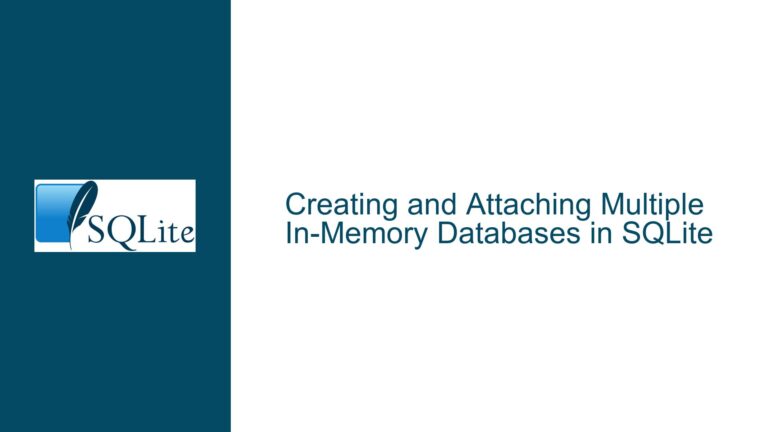FTS5 API Error Handling and Terminology Clarification Issues
Issue Overview: Inconsistent Error Checking in FTS5 API Functions and Ambiguous Terminology
The FTS5 extension API in SQLite provides a powerful set of functions for full-text search operations. However, the current implementation exhibits inconsistencies in error handling across its functions, leading to potential memory access violations and undefined behavior. Specifically, certain functions like xPhraseFirst and xPhraseFirstColumn fail to validate input parameters, such as phrase numbers, before performing operations. This can result in out-of-bounds memory access when invalid parameters are provided. Additionally, the API lacks comprehensive error codes for invalid inputs, such as SQLITE_RANGE, which is inconsistently applied across functions.
Another significant issue is the ambiguity in the API’s terminology, particularly around terms like "phrases," "tokens," "instances," and "hits." This ambiguity complicates the understanding of how the API functions interact with each other and how they should be used in practice. For example, the xInstToken function does not clearly specify how it handles multiple matches of the same token within a document, leading to confusion about its intended behavior. The lack of clear examples and documentation exacerbates these issues, making it difficult for developers to implement advanced features like inverse document frequency (IDF) and scoring algorithms effectively.
Possible Causes: Lack of Parameter Validation and Insufficient Documentation
The root cause of the inconsistent error checking lies in the implementation of the FTS5 API functions. Functions like xPhraseFirst and xPhraseFirstColumn do not include parameter validation logic, such as checking whether the provided phrase number is within the valid range. This omission allows the functions to proceed with invalid inputs, leading to memory access violations. In contrast, functions like xColumnTotalSize and xColumnSize correctly validate their inputs and return appropriate error codes, such as SQLITE_RANGE, when invalid parameters are detected. This inconsistency suggests that the error-handling logic was not uniformly applied across the API during its development.
The ambiguity in terminology and lack of clear documentation stem from the complexity of full-text search concepts and the API’s design. The FTS5 API is designed to support a wide range of use cases, from simple text searches to advanced ranking and scoring algorithms. However, the documentation does not adequately explain the relationships between the API functions or provide practical examples of how to use them together. For instance, the xQueryPhrase function is described in isolation, without clarifying its role in scoring algorithms or its interaction with other functions like xInstToken. This lack of context makes it challenging for developers to understand the API’s full capabilities and apply it effectively in their projects.
Troubleshooting Steps, Solutions & Fixes: Enhancing Error Handling and Clarifying Documentation
To address the inconsistent error checking in the FTS5 API, all functions should be updated to include comprehensive parameter validation. For example, functions like xPhraseFirst and xPhraseFirstColumn should validate the phrase number parameter and return SQLITE_RANGE if it is out of bounds. Similarly, xColumnText should return SQLITE_RANGE instead of SQLITE_OK when an invalid column number is provided. These changes would ensure consistent error handling across the API and prevent memory access violations. Additionally, the API should be extended to include error codes for other invalid inputs, such as invalid token or instance numbers, to provide developers with more granular control over error handling.
To improve the clarity of the API’s terminology and documentation, the following steps should be taken. First, the documentation should include a detailed example that demonstrates the use of the API functions in a real-world scenario, such as implementing a scoring algorithm. This example should clearly define terms like "phrases," "tokens," "instances," and "hits" and show how they relate to each other. For instance, the example could illustrate how the xQueryPhrase function is used to retrieve phrase matches and how the xInstToken function is used to process multiple matches of the same token within a document. This would help developers understand the API’s capabilities and how to use it effectively.
Second, the documentation should provide a high-level overview of the API’s design and its intended use cases. This overview should explain the purpose of each function and how they interact with each other. For example, it should clarify that xQueryPhrase is not only used for retrieving phrase matches but also plays a key role in scoring algorithms like BM25. This would help developers understand the API’s full potential and avoid common pitfalls. Additionally, the documentation should include guidelines for implementing advanced features like IDF and scoring, with references to the relevant API functions and examples of their use.
Finally, the API should be extended to include additional functions or parameters that address common use cases and simplify development. For example, the xInstToken function could be updated to include a parameter for specifying the match number, allowing developers to handle multiple matches of the same token more easily. Similarly, the API could include helper functions for common tasks like calculating IDF or implementing custom scoring algorithms. These enhancements would make the API more intuitive and reduce the learning curve for new developers.
By addressing these issues, the FTS5 API can provide a more robust and user-friendly experience for developers, enabling them to implement advanced full-text search features with confidence. The improved error handling and documentation would also make it easier to debug and optimize applications that rely on the API, leading to better performance and reliability.






